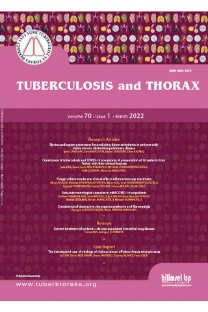Reliability and validity of the Turkish version of the pediatric sleep questionnaire: a tool for prediction of sleep related breathing disorder
Pediatrik uyku anketi Türkçe formunun geçerlilik ve güvenilirliği: Uyku ile ilişkili solunum bozukluğunun tahmininde bir araç
___
- 1. Lumeng JC, Chervin RD. Epidemiology of pediatric obstructive sleep apnea. Proc Am Thorac Soc 2008; 5: 242-52.
- 2. Sogut A, Yilmaz O, Dinc G, Yuksel H. Prevalence of habitual snoring and symptoms of sleep-disordered breathing in adolescents. Int J Pediatr Otorhinolaryngol. 2009; 73: 1769-73.
- 3. Yilmaz O, Dinc G, Sogut A, Aktulun S, Arslan B, Kocacan M, et al. Prevalence of habitual snoring in Aegean region of Turkey and associated risk factors. Turk Arch Ped 2010 (in press).
- 4. Kaditis AG, Finder J, Alexopoulos EI, Starantzis K, Tanou K, Gampeta S, et al. Sleep-disordered breathing in 3680 Greek children. Pediatr Pulmonol 2004; 37: 499-509.
- 5. Wildhaber JH, Moeller A. Sleep and respiration in children: time to wake up! Swiss Med Wkly 2007; 137: 689-94.
- 6. Sogut A, Yilmaz O, Dinc G, Yuksel H. Prevalence of habitual snoring and symptoms of sleep-disordered breathing in adolescents. Int J Pediatr Otorhinolaryngol 2009.
- 7. Chervin RD, Hedger KM, Dillon JE, Pituch KJ. Pediatric Sleep Questionnaire (PSQ): validity and reliability of scales for sleep-disordered breathing, snoring, sleepiness, and behavioral problems. Sleep Med 2000; 1: 21-32.
- 8. Chervin RD, Weatherly RA, Garetz SL, Ruzicka DL, Giordani BJ, Hodges EK, et al. Pediatric sleep questionnaire: prediction of sleep apnea and outcomes. Arch Otolaryngol Head Neck Surg 2007; 133: 216-22.
- 9. Desager KN, Nelen V, Weyler JJ, De Backer WA. Sleep disturbance and daytime symptoms in wheezing school-aged children. J Sleep Res 2005; 14: 77-82.
- 10. Chervin RD, Weatherly RA, Ruzicka DL, Burns JW, Giordani BJ, Dillon JE, et al. Subjective sleepiness and polysomnographic correlates in children scheduled for adenotonsillectomy vs other surgical care. Sleep 2006; 29: 495-503.
- 11. American Psychiatric Association. Diagnostic and Statistical Manual of Mental Disorders. 4th ed. Washington DC: American Psychiatric Association, 1994.
- 12. Ng DK, Chan C, Chow AS, Chow P, Kwok K. Childhood sleepdisordered breathing and its implications for cardiac and vascular diseases. J Paediatr Child Health 2005; 41: 640-6.
- 13. Mitchell RB, Boss EF. Pediatric obstructive sleep apnea in obese and normal-weight children: impact of adenotonsillectomy on quality-of-life and behavior. Dev Neuropsychol 2009; 34: 650-61.
- 14. Honaker SM, Gozal D, Bennett J, Capdevila OS, Spruyt K. Sleep- disordered breathing and verbal skills in school-aged community children. Dev Neuropsychol 2009; 34: 588-600.
- 15. Ravid S, Afek I, Suraiya S, Shahar E, Pillar G. Sleep disturbances are associated with reduced school achievements in firstgrade pupils. Dev Neuropsychol 2009; 34: 574-87.
- 16. Marcus CL. Sleep-disordered breathing in children. Curr Opin Pediatr 2000; 12: 208-12.
- 17. Bass JL, Corwin M, Gozal D, Moore C, Nishida H, Parker S, et al. The effect of chronic or intermittent hypoxia on cognition in childhood: a review of the evidence. Pediatrics 2004; 114: 805- 16.
- 18. Lund HG, Reider BD, Whiting AB, Prichard JR. Sleep patterns and predictors of disturbed sleep in a large population of college students. J Adolesc Health 2010; 46: 124-32.
- 19. Rutishauser C, Sawyer SM, Bowes G. Quality of life assessment in children and adolescents with asthma. Eur Respir J 1998; 12: 486-94.
- ISSN: 0494-1373
- Yayın Aralığı: 4
- Başlangıç: 1951
- Yayıncı: Tuba Yıldırım
Kuş besleyicisi hastalığı (iki olgu nedeniyle)
Murat YALÇINSOY, Esen AKKAYA, Sinem GÜNGÖR, Sevinç BİLGİN, Belma AKBABA
A case of pulmonary embolism confirmed by endobronchial ultrasound
Erdoğan ÇETİNKAYA, Sedat ALTIN, Aydın YILMAZ, Atayla GENÇOĞLU, Akif ÖZGÜL, Seda ONUR
Surya KANT, Anand Kumar MAURYA, Vijaya Lakshmi NAG, Ram Awadh Singh KUSHWAHA, Manoj KUMAR, Tapan N. DHOLE
Göğüs hastalıkları yoğun bakım ünitesindeki akut dahili sorunların mortaliteye etkisi
KALAMANOĞLU Merih BALCI, Murat YALÇINSOY, Nalan ADIGÜZEL, Gökay GÜNGÖR, Cüneyt SALTÜRK, Zuhal KARAKURT, Müyesser ERTUĞRUL, YAZICIOĞLU Özlem MOÇİN, Eylem ACARTÜRK, Gülgün ÇETİNTAŞ
KOAH’da yeni tedavi seçeneği: Fosfodiesteraz-4 inhibitörleri
Abdurrahman ŞENYİĞİT, Cengizhan SEZGİ
İnvaziv mekanik ventilasyon gerektiren suçiçeği pnömonisi
Bünyamin SERTOĞULLARINDAN, Bülent ÖZBAY
Bilateral multiple tumor-like endobronchial tuberculosis, diagnosed with bronchoscopic examination
Yasemin SAYGIDEĞER, Sadık ARDIÇ, Özlem SEVER, Burcu OKTAY, Emine SEVGİ, Hikmet FIRAT
Asiye KANBAY, Nuri TUTAR, Hakan BÜYÜKOĞLAN, Fatma Sema OYMAK, Ertuğrul MAVİLİ, Mehmet BİLGİN, İnci GÜLMEZ, Ramazan DEMİR
Giant mediastinal parathyroid adenoma
Arif Osman TOKAT, Murat ÖZKAN, Sezgin KARASU, Hüseyin ÇAKMAK
